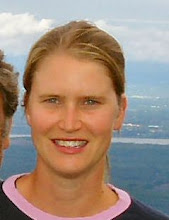Welcome to the 2009 season! We are excited for the first harvest after months of preparation. We have had a busy and productive spring and look forward to a great year.
Over the winter we received many concerned emails from you about food safety bills being debated in Congress. H.R. 875 was one that brought about the most controversy as we heard that the bill would outlaw organic farming and backyard gardening. We also heard that in order to grow greens we would soon have to plow up all of our grass strips and cut down the trees around the fields to prevent wildlife from coming into contact with our produce. We are supportive of stricter food safety guidelines, especially for the industrial sector of agriculture, but we were and are worried about how those laws could affect farms like ours. So, fearing the worst, we decided to educate ourselves on exactly what food safety guidelines and laws would mean for our farm.
In April, I attended a food safety workshop with four other organic farmers in our neighborhood and about 20 conventional farmers. Our regional Cornell Cooperative Vegetable Extension Agent, Chuck Bornt, organized the workshop to answer all of the questions that farmers were asking him. The food safety regulations, at this point, are only required by certain grocery store chains and large produce wholesalers and not the federal government. These regulations are called GAP (Good Agricultural Practices) Standards and are only concerned with microbial or chemical contamination of the produce. Some farmers’ markets in the Hudson Valley may also soon require GAP certification. There are many private institutions as well as the USDA that will certify your crops as GAP certified. Each crop a farmer grows needs to be individually inspected up to three times each season and the inspection costs $92 an hour plus driving to and from the farm. To be certified you need a written food safety plan that covers all aspects of harvesting and handling of the crops grown on a farm. A food safety plan is a good thing and most of the GAP guidelines are common sense and practical. At the workshop we had the chance to discuss our farming practices with GAP inspectors and food safety specialists. We will soon post ours on our website at www.roxburyfarm.com.
The five organic farms at the workshop posed unusual questions for the certifiers and experts. Such as, how do you feel about CSA members harvesting crops for the whole membership (i.e. when you come to a member workday to take part in the garlic, potato, sweet potato, or winter squash harvest)? They don’t like that idea as they see this as a huge risk for microbial contamination. We asked about written guidelines for incorporating animals into a farm. There aren’t any that address the needs of a farm to be more self sustaining with their fertility. One farmer asked about certifying a farm that grows 60 crops. Presently each crop would need to be certified individually. This is unpractical and unaffordable for most of the organic growers in our area. At this point there is no other alternative to the crop by crop inspection. This needs to be changed if farmers’ markets are going to require GAP certification or there won’t be any farmers at the market. The inspectors were open to a discussion about how we farm and said they will need to be educated about sustainable farming practices in order to certify our farms.
Our fears about the end of farming as we know it were unfounded (so far). There are no laws that require us to become GAP certified, although we do follow the guidelines that exist at this point. Educating ourselves about food safety helped us to make some changes on the farm. The food safety experts don’t want soil buildup in the packing barn. Our washing line for the greens, broccoli, peas, etc was in the same barn as the washing line for the root crops. They also want plastic walls that can be washed down. This spring we poured cement for a new washing shed for the root crop washers. We will begin construction on the roof and walls this week. We built a new wall in the washing and packing barn that is covered with white vinyl that is completely washable. We also installed new lighting in the barn that will allow us to do a better job of inspecting the produce. We hope these changes will result in a better product and at the same time has the benefit of a much more pleasant working environment.
We need to continue to be aware of what is going on with food safety legislation. We need to make sure that food safety experts and the lawmakers understand what it means to be sustainable and to look at a farm holistically. We need to make sure that they are just as concerned about the application of synthetic fertilizers, pesticides, and insecticides as they are about compost and organic soil amendments. Our attention to food safety is not only to prevent microbial contamination. We are also concerned with growing food in a way that improves soil health, provides habitat for beneficial insects, rare plants, and other wildlife, protects water quality, and allows you to have a connection to the land and people that grow your food. We hope you will continue to let us know about your concerns and that we can all be part of the dialogue to improve not only food safety but the sustainability of agriculture in the U.S. ~Jody
Subscribe to:
Post Comments (Atom)




1 comment:
Just to let you know that we celebrate with you as the seson starts. And that Laura and me continue to feel so proud of the good farming you do. And blessed by the opportunity to be part of it.
Ricardo
Post a Comment